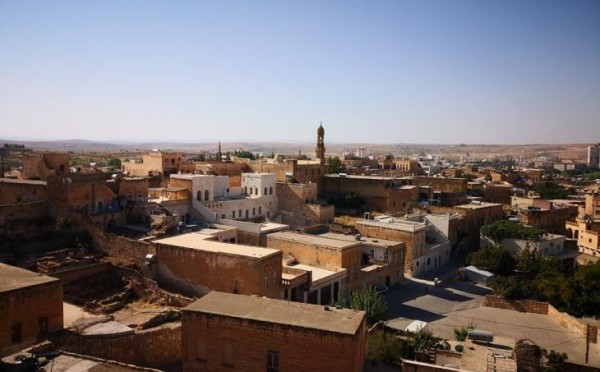
In the old district of Midyat, a town with 100,000 inhabitants, there are still as many church towers as there are mosque minarets. The city in south-eastern Turkey has been inhabited by Kurds, Arabs and Arameans for centuries
Ishtartv.com
- qantara.de
Marian Brehmer, 24.12.2019
There are only a few thousand
Aramaic Christians left in south eastern Anatolia. And they are intent on
preserving their ancient culture dating back one-and-a-half millennia. Marian
Brehmer visits a community marked by exile, flight…and eventual return to the
homeland.
The ball flits through the air.
It looks as though it might even sail over the church wall. The six young
players beneath the bell tower with the metal cross give each other a few
soccer tips. As their language echoes over the yard it sounds different to
Turkish, it’s throaty like Arabic and sounds archaic, with a linguistic melody
all its own. It’s a dialect of Aramaic, the language that Jesus is thought to
have conversed in.
The evening sun has drenched the
church yard in a mystical golden-yellow light. The caretaker bolts the heavy
wooden door of the Kirklar Church, one of seven Syriac-Orthodox churches in the
southern Turkish city of Mardin. Seven year-old Theodora is bored watching the
soccer game. The first-grader has tied her soot-black hair into a ponytail; her
mischievous grin reveals gaps in her teeth.
After a while, Theodora’s uncle
Iliyo appears, the 22 year-old son of the parish priest. He puts his arm around
his niece. "Theodora, speak German with the guest," he says in
Aramaic. Theodora was born in Germany and lives with her parents and two
siblings near Heilbronn. Now, in the summer holidays, she’s paying her first
visit to the homeland of her ancestors, walking on the ground that Aramaic
Christians regard as sacred, in the heartland of the Syriac-Orthodox church.
Keeping the Aramaic culture alive
Here, her grandparents were wont
to work and pray. "It’s a bit hot, but the children are nice here,"
Theodora lets her guard down. She doesn’t understand any Turkish, but she can
talk to her peers from the Kirklar parish in Aramaic.
My big sister, Theodora’s mother,
left Turkey years ago. But we’re trying to keep the Aramaic culture here alive.
We don’t want people to emigrate to Europe," explains Iliyo. "But of
course we can’t prevent them doing it." Now, during the summer months, the
Kirklar Church is offering courses in Aramaic, to help the descendants of early
Christians improve their knowledge of the ancient liturgical language – both
spoken and written.
Mesopotamia, the territory
between the Euphrates and the Tigris in the tri-border zone between Turkey,
Syria and Iraq has been the homeland of the Aramaic Christians for 700 years.
The region, which includes the modern Turkish province of Mardin, is one of the
oldest regions in the world to have been continuously populated by Christians.
As representatives of a tradition that’s been unbroken since the beginnings of
Christianity until the present day, churchgoers in the parish of Kirklar are
living with a sense of responsibility.
|